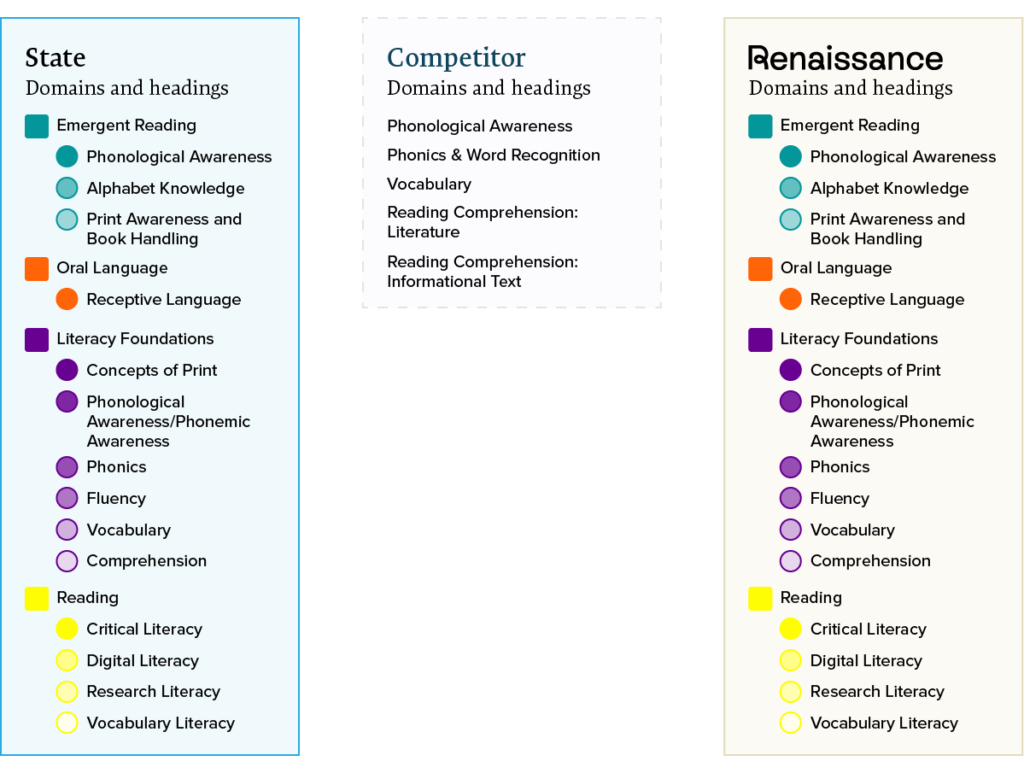January 12, 2024
Sometimes, we talk about a company having a “secret sauce.” Perhaps this phrase points back to the famous “special sauce” on a McDonald’s Big Mac—the recipe for which is not much of a secret. I’m not sure, but I do know that some companies have an approach that differs significantly from their competitors—something unique that sets them and their products apart.
In this spirit, there’s something we do at Renaissance that is truly unique in the field of K–12 assessment. We work with it so often and it’s so ubiquitous in our solutions that we—and the educators using our products—largely take it for granted.
However, a recent experience reminded me of its importance in supporting teaching and learning.

Learning progressions built for your state standards
I’m talking about the work we undertake to create custom learning progressions for each US state, to reflect each state’s standards of learning for reading and mathematics. These learning progressions, which form the “backbone” of our Star Assessments and many of our practice tools, use the very same domains and headings as the states do, such as “Print Concepts” in reading and “Geometry and Measurement” in math.
This means that Star reports and dashboards are organized differently for teachers in Texas—who are concerned about their students’ progress on the Texas Essential Knowledge and Skills (TEKS)—than for teachers in Virginia, who are concerned about students’ progress on the Virginia Standards of Learning (SOL). The same process applies to California, Georgia, Oklahoma, Wisconsin, and every other US state. We’ve even created reading and math learning progressions for Washington, DC.
Why is this so important?

Learning progressions, state standards, and skills
We organize the information in our products exactly as each state organizes its standards so that teachers can have a copy of their standards in one hand and a Star report in the other and see perfect alignment.
But it’s not just about organization and convenience.
Our content teams—working with the authors of different standards sets and with experts from around the world—undertake the time-intensive process of taking each standard in each US state and breaking it down into discrete, teachable skills. (This process is often referred to as “unpacking the standards.”)
Then, the most difficult work begins as the skills are placed in a teachable order, to reflect how learning develops within and across each domain.
The result is a learning progression that matches each state’s unique standards, helping educators to understand where their students are now and whether they’re on track to meet grade-level expectations by the end of the school year.

Learning progressions and instructional planning
The importance and value of this unique approach of tailoring the domains and skills in our solutions to each state’s standards was clearly illustrated during a conference I attended recently. While there, I met with a district team to discuss how Star Assessments compare to a competitor’s offering. As we began to discuss reporting and instructional recommendations, a report from the competitor’s reading assessment was shown, and I was dumbstruck.
As I looked at the report, I quickly recognized that it was organized using the domains of the Common Core State Standards for ELA (e.g., Reading Comprehension: Literature, Reading Comprehension: Informational Text, etc.). This would be completely appropriate in a state using the Common Core. However, we were in a state that had left those standards years ago.
What does this suggest about the alignment of this assessment to the state’s standards? And how inefficient and frustrating must it be for the district’s teachers to have a copy of their state standards in one hand and a report from this assessment in another and find that they are organized completely differently?
This stands in stark contrast to our approach at Renaissance, which ensures that, when using Star Assessments and most of our practice products, teachers see reports and dashboards that directly reflect the domains and headings of their standards:
- Teachers in states using the Common Core see the Common Core clearly reflected in the information presented.
- Teachers in a non-Common Core state do not. They see their standards, with their unique domains and headings.
This is illustrated in the graphic below, where you’ll see an exact match between this particular state’s organization of its standards and Renaissance’s learning progression. You’ll also see the clear mismatch between the state’s organization and that of the other assessment provider:

Tailoring learning content to teachers’ and students’ needs
This degree of customization is unmatched in education technology. While some companies may have built a single, highly ordered list of skills or a “continuum of learning,” these are not tailored to the standards of each state like Renaissance’s learning progressions.
To support schools around the world, we’ve now built more than 150 learning progressions. As I mentioned earlier, they’ve been developed for all 50 US states and for Washington, DC. We’ve also developed learning progressions for Alberta, Canada, and for the National Curriculum of England.
We’ve even developed multiple learning progressions for states as they have changed their standards. For example, 12 new learning progressions were built in 2023, given that several US states and England all updated or revised their mathematics and/or reading standards.
We will continue this work in 2024 and beyond.
Tools for high-impact learning
Discover Renaissance assessment and practice solutions for pre-K‒grade 12 learners.

Focus Skills: The building blocks of student learning
If you’re not currently using Renaissance solutions, you can still see this alignment process for yourself by visiting our Focus Skills Resource Center.
What are Focus Skills?
Our work with learning progressions confirmed what most educators have grasped intuitively: that in both reading and math, not all skills are created equal. At each grade level, some skills have an outsize influence on students’ success. They are prerequisites for future learning and, as a result, are absolutely essential to students’ progress.
At Renaissance, we call these skills Focus Skills to highlight their essential nature and to indicate they should receive intense instructional focus, regardless of the particular curriculum materials a school is using.
Because Focus Skills are an integral part of our state-specific learning progressions, they are customized to the standards of each state. Here is how you can get a feel for this:
- Visit our Focus Skills Resource Center and scroll down to the “Focus Skills by the numbers” section.
- Select either Literacy or Math, and make sure your state is selected from the dropdown menu.
- You’ll see the domains and headings of your standards appear to the left, and the number of Focus Skills per grade level on the right, represented in a bar graph.
- To explore Focus Skills for individual grades, hover over any of the bars and click “View.”
Try switching to other states. As you do, you’ll see different domains and headings appear on the left, and you’ll see variations in the number of Focus Skills at each grade level on the right. (The only exception will be when you toggle between states that are both using the Common Core).

Focusing on the most essential reading and math skills
Our Focus Skills Resource Center is accessible to every educator, and we invite everyone to use this powerful resource to prioritize instruction. Educators using Renaissance solutions can, however, do even more with Focus Skills. For example:
- Focus Skills are flagged on Instructional Planning Reports in Star Assessments, so you can easily see which skills are most essential for students to master in the weeks and months ahead, based on your state standards.
- Focus Skills are also accessible within our Freckle practice program for math and ELA. Freckle allows you to quickly assign practice activities that center on Focus Skills, and to easily view students’ practice and progress on these critical skills throughout the year.
Renaissance is also unique in offering an authentic learning progression of Spanish reading, as well as Focus Skills in Spanish. Educators in bilingual and dual-language programs can assess students in both Spanish and English using Star Assessments. They can then view Instructional Planning Reports in each language, which highlight the most essential skills for students’ success.

Understanding students’ learning trajectories
Renaissance’s pioneering work with learning progressions and Focus Skills has one more important dimension.
Some providers offer “hypothetical learning progressions” based on how learning is hypothesized—or predicted—to develop within and across grade levels. In contrast, Renaissance’s learning progressions are empirically validated, meaning that our content teams use data from millions of Star tests to create and fine-tune the progressions, ensuring they reflect how learning actually develops.
Using actual student performance data to inform, validate, and refine the sequencing of skills has been heralded as “a contribution to the field of learning progression development” by assessment expert Dr. Margaret Heritage. In short, no other company has built as many learning progressions as we have, and no other company has taken the development process to such a deep and refined level.
The value of this work for educators should be apparent. When using tools from other providers, you may need a “secret decoder ring”—an alignment guide or crosswalk document to help you match the domains and skills in your state standards with the domains and skills in your edtech products.
This is not the case when using Renaissance solutions. You’ll find an exact match between our learning progressions and your standards.
In this sense, we can say that Star Assessments and their associated learning progressions are not merely aligned to your standards, they are built for them. We offer you an assessment experience that stands out like a tailored, custom-made garment, in contrast with the “one-size-fits-all” approach used by our competitors.
In short, Renaissance can offer you insights and resources that no one else can, because we’ve done the work that no one else has.

Assessment Masterclass: Because mastery matters
There’s more to say about learning progressions, Focus Skills, and effective assessment practices. I invite you to take a few minutes to watch these sessions in my new Assessment Masterclass series:
- Session 1: The Perfect Screening Tool, where I share the #1 mistake to avoid in universal screening.
- Session 2: Learning Progressions, where I give you a closer look at Renaissance’s process for unpacking state standards.
- Session 3: Focus Skills, where I explain in detail how we identified these key skills—and why some of the skills may cause students to “trip.”
Learn more
Connect with an expert to arrange a personalized walk-through of Star Assessments, Freckle, or other Renaissance solutions for literacy and math.


